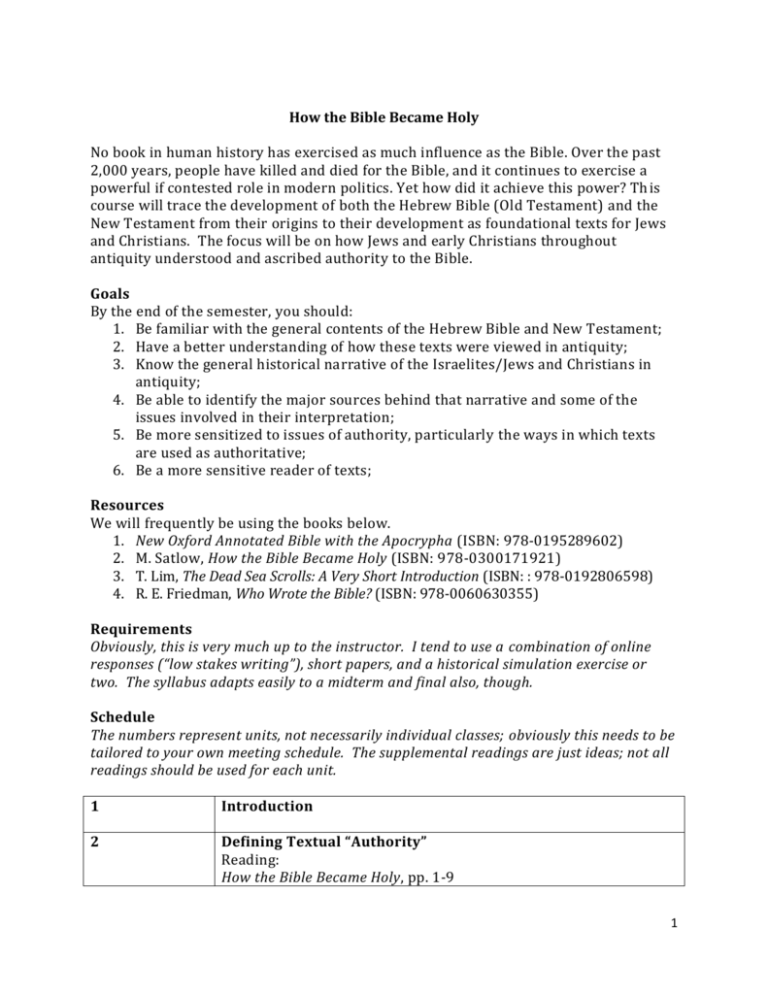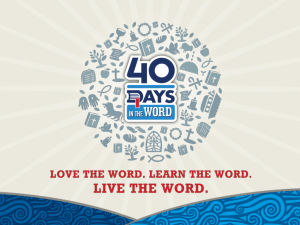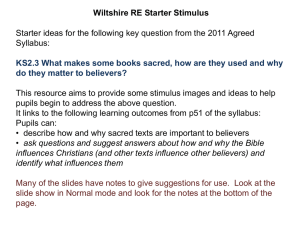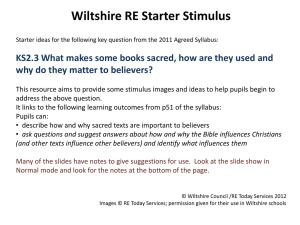here - Michael L. Satlow
advertisement

How the Bible Became Holy No book in human history has exercised as much influence as the Bible. Over the past 2,000 years, people have killed and died for the Bible, and it continues to exercise a powerful if contested role in modern politics. Yet how did it achieve this power? Th is course will trace the development of both the Hebrew Bible (Old Testament) and the New Testament from their origins to their development as foundational texts for Jews and Christians. The focus will be on how Jews and early Christians throughout antiquity understood and ascribed authority to the Bible. Goals By the end of the semester, you should: 1. Be familiar with the general contents of the Hebrew Bible and New Testament; 2. Have a better understanding of how these texts were viewed in antiquity; 3. Know the general historical narrative of the Israelites/Jews and Christians in antiquity; 4. Be able to identify the major sources behind that narrative and some of the issues involved in their interpretation; 5. Be more sensitized to issues of authority, particularly the ways in which texts are used as authoritative; 6. Be a more sensitive reader of texts; Resources We will frequently be using the books below. 1. New Oxford Annotated Bible with the Apocrypha (ISBN: 978-0195289602) 2. M. Satlow, How the Bible Became Holy (ISBN: 978-0300171921) 3. T. Lim, The Dead Sea Scrolls: A Very Short Introduction (ISBN: : 978-0192806598) 4. R. E. Friedman, Who Wrote the Bible? (ISBN: 978-0060630355) Requirements Obviously, this is very much up to the instructor. I tend to use a combination of online responses (“low stakes writing”), short papers, and a historical simulation exercise or two. The syllabus adapts easily to a midterm and final also, though. Schedule The numbers represent units, not necessarily individual classes; obviously this needs to be tailored to your own meeting schedule. The supplemental readings are just ideas; not all readings should be used for each unit. 1 Introduction 2 Defining Textual “Authority” Reading: How the Bible Became Holy, pp. 1-9 1 McDonald, “What Do We Mean by Canon?” in Jewish and Christian Scriptures (2010), pp. 8-40 D. Brakke, “Scriptural Practices in Early Christianity,” in Invention, Rewriting, Usurpation (2012): 263-80 What does it mean to give a text “authority”? How do we today give texts authority? 3 Textuality in the Ancient Near East Reading: Van der Toorn, Scribal Culture and the Making of the Hebrew Bible (2007), pp. 9-49 What role did texts play in antiquity? 4 Biblical Israel Reading: How the Bible Became Holy, pp. 13-30 2 Kings 9:1-10:36 Amos What do we know about the earliest history of the Israelites, and how do we know it? 5 The Southern Kingdom: Judah Reading: How the Bible Became Holy, pp. 31-51 Rollston, Writing and Literacy in the World of Ancient Israel (2010), “Scribal Education,” pp. 91-114 and “Extent of Literacy,” pp. 127136 Shanks, “Will King Hezekiah Be Dislodged from His Tunnel?” BAR 39:5 (2013) 2 Kings 18-25 Isaiah 36-39 Deuteronomy 16-17 Did Judahites know how to read? 6 Prophecy Reading: 1 Samuel 1 Kings 17-21 Isaiah 1-13 How did one become a prophet? What did a prophet do? Were prophetic oracles written down, and if so, by whom and for what reason? 7 Law Reading Exodus 21-23 2 Deuteronomy 12-26 “Hammurabi’s Code of Laws” Slanski, “The Law of Hammurabi and its Audience,” Yale Journal of Law and the Humanities 24 (2012) What was the purpose of ancient law codes? How was justice administered in antiquity? 8 Narratives Reading: Genesis What problems does this narrative pose? What is its (and/or its parts) purpose? 9 Wisdom Reading: Job Proverbs 16-25 For these authors, what role did writing and texts play in the acquisition of knowledge? 10 The Torah and Source Criticism Reading: Who Wrote the Bible? 11 Exile and Return Reading: How the Bible Became Holy, pp. 52-68 Jeremiah 1-3, 27, 36 Ezekiel 3 Haggai L. Pearce, “Continuity and Normality in Sources Relating to the Judean Exile,” Hebrew Bible and Ancient Israel 3:2 (2015), 163-184 Esther “Passover Letter” Cyrus Cylinder How did the destruction of the Jerusalem temple affect the Judahite elite? What changed in Babylonia? Did texts have authority in these communities? 12 Ezra and Nehemiah Reading: How the Bible Became Holy, pp. 69-100 Ezra Nehemiah 1, 5, 8-9; Did the Jews accept the Torah? 3 13 Hellenism Reading: How the Bible Became Holy, pp. 103-23 Ecclesiastes Ecclesiasticus (Ben Sira) Prologue, 1, 9-10, 35, 44:23-end of book What is Hellenism and what impact did it have on Jerusalem? Did the author of Ecclesiastes know the Torah? Compare Ecclesiastes to Ecclesiasticus. 14 Early Apocalypticism Reading: Genesis 5-6 1 Enoch 1-5 and 90:6-42 Daniel 7-9 What is “apocalypticism”? Why would it appeal to people? 15 Maccabean Revolt Reading: How the Bible Became Holy, pp. 124-35 1 Maccabees 1-2, 14:35-49 2 Maccabees 1-8 Ma, “Re-examining Hanukkah” (online) What was the cause of the Maccabean Revolt? 16 Pharisees, Sadducees, Essenes: Origins Reading: How the Bible Became Holy, pp. 136-52 Josephus, Antiquities Book 13, chapter 10.5-6 (288-300) Jewish War Book 2, chapter 8.2-14 (119-166) Who, according to Josephus, were the Pharisees, Sadducees, and Essenes? How did they originate? 17 Jubilees Reading: Jubilees Why do you think the book of Jubilees was written? What is the author’s goal? 18 Septuagint Reading: How the Bible Became Holy, pp. 153-70 T.M. Law, When God Spoke Greek, pp. 33-57 Letter of Aristeas Why was the Torah translated into Greek? How was it used? 4 19 Philo Reading: Philo, Allegorical Interpretation I.I-VII Life of Moses I.I-V Special Laws I.I-II How does Philo treat the Bible? 20 Dead Sea Scrolls: Historical Background Reading: How the Bible Became Holy, pp. 171-88 T. Lim, The Dead Sea Scrolls Serekh ha-Yahad Miqsat Ma’ase Ha-Torah (=MMT) A Commentary on Nahum The Last Days: A Commentary on Selected Verses What are the Dead Sea Scrolls? What role did Scripture play in the life of the community? How do these works treat Scripture? Compare their approach to that of Philo. 21 The Roman Period: Historical Introduction Reading: How the Bible Became Holy, 191-209 22 Jesus Reading: Mark Matthew What do we know about Jesus? What might we know about the authors of Mark and Matthew? 23 Paul Reading: How the Bible Became Holy, pp. 210-223 Romans Galatians Compare Paul’s approaches to the Torah (and the status of Jewish law) in Romans and Galatians. Do they cohere? 24 Gospel of John Reading: John Compare and contrast John – specifically its approach to the Torah and the Jews – to Paul and Matthew 5 25 Luke and Acts Reading: How the Bible Became Holy, pp. 224-240 Luke Acts Many scholars consider Luke and Acts to have the same author. What authority do they each give to Scripture? Are they written in order to be Scripture? 26 The Second Century Reading: How the Bible Became Holy, pp. 241-256 Justin Martyr, 1 Apology 31, 67 Irenaeus, Against Heresy, 3.11 Gospel of Thomas Hahneman, “The Muratorian Fragment” What role did Scripture play in different Christian groups in the second century? 27 The Rabbis: Reading: How the Bible Became Holy, pp. 257-275 M. Brettler, “The Canonization of the Bible,” in The Jewish Study Bible (2nd ed.), pp. 2153-2158 Selections from Genesis Rabbah 6








